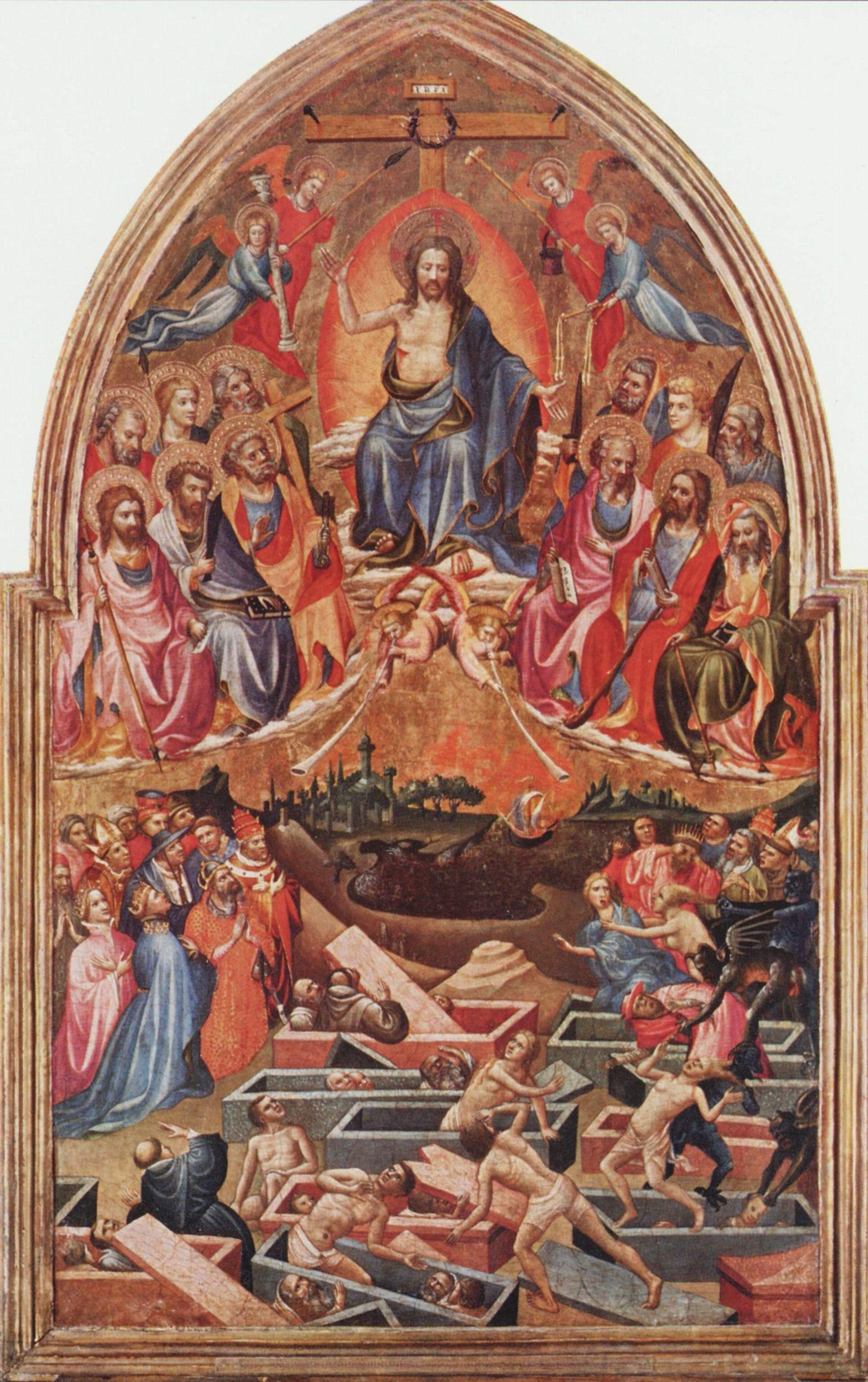For your reading, reflection, faith-sharing, comments, questions, discussion.
KEYWORDS: catholic; lk13; ordinarytime; prayer
To: nickcarraway; NYer; ELS; Pyro7480; livius; ArrogantBustard; Catholicguy; RobbyS; marshmallow; ...

Alleluia Ping
Please FReepmail me to get on/off the Alleluia Ping List.
| Luke | |||
| English: Douay-Rheims | Latin: Vulgata Clementina | Greek NT: Byzantine/Majority Text (2000) | |
| Luke 13 | |||
| 22. | And he went through the cities and towns teaching, and making his journey to Jerusalem. | Et ibat per civitates et castella, docens, et iter faciens in Jerusalem. | και διεπορευετο κατα πολεις και κωμας διδασκων και πορειαν ποιουμενος εις ιερουσαλημ |
| 23. | And a certain man said to him: Lord, are they few that are saved? But he said to them: | Ait autem illi quidam : Domine, si pauci sunt, qui salvantur ? Ipse autem dixit ad illos : | ειπεν δε τις αυτω κυριε ει ολιγοι οι σωζομενοι ο δε ειπεν προς αυτους |
| 24. | Strive to enter by the narrow gate; for many, I say to you, shall seek to enter, and shall not be able. | Contendite intrare per angustam portam : quia multi, dico vobis, quærent intrare, et non poterunt. | αγωνιζεσθε εισελθειν δια της στενης πυλης οτι πολλοι λεγω υμιν ζητησουσιν εισελθειν και ουκ ισχυσουσιν |
| 25. | But when the master of the house shall be gone in, and shall shut the door, you shall begin to stand without, and knock at the door, saying: Lord, open to us. And he answering, shall say to you: I know you not, whence you are. | Cum autem intraverit paterfamilias, et clauserit ostium, incipietis foris stare, et pulsare ostium, dicentes : Domine, aperi nobis : et respondens dicet vobis : Nescio vos unde sitis : | αφ ου αν εγερθη ο οικοδεσποτης και αποκλειση την θυραν και αρξησθε εξω εσταναι και κρουειν την θυραν λεγοντες κυριε κυριε ανοιξον ημιν και αποκριθεις ερει υμιν ουκ οιδα υμας ποθεν εστε |
| 26. | Then you shall begin to say: We have eaten and drunk in thy presence, and thou hast taught in our streets. | tunc incipietis dicere : Manducavimus coram te, et bibimus, et in plateis nostris docuisti. | τοτε αρξεσθε λεγειν εφαγομεν ενωπιον σου και επιομεν και εν ταις πλατειαις ημων εδιδαξας |
| 27. | And he shall say to you: I know you not, whence you are: depart from me, all ye workers of iniquity. | Et dicet vobis : Nescio vos unde sitis : discedite a me omnes operarii iniquitatis. | και ερει λεγω υμιν ουκ οιδα υμας ποθεν εστε αποστητε απ εμου παντες οι εργαται της αδικιας |
| 28. | There shall be weeping and gnashing of teeth, when you shall see Abraham and Isaac and Jacob, and all the prophets, in the kingdom of God, and you yourselves thrust out. | Ibi erit fletus et stridor dentium : cum videritis Abraham, et Isaac, et Jacob, et omnes prophetas in regno Dei, vos autem expelli foras. | εκει εσται ο κλαυθμος και ο βρυγμος των οδοντων οταν οψησθε αβρααμ και ισαακ και ιακωβ και παντας τους προφητας εν τη βασιλεια του θεου υμας δε εκβαλλομενους εξω |
| 29. | And there shall come from the east and the west, and the north and the south; and shall sit down in the kingdom of God. | Et venient ab oriente, et occidente, et aquilone, et austro, et accumbent in regno Dei. | και ηξουσιν απο ανατολων και δυσμων και βορρα και νοτου και ανακλιθησονται εν τη βασιλεια του θεου |
| 30. | And behold, they are last that shall be first; and they are first that shall be last. | Et ecce sunt novissimi qui erunt primi, et sunt primi qui erunt novissimi. | και ιδου εισιν εσχατοι οι εσονται πρωτοι και εισιν πρωτοι οι εσονται εσχατοι |

Catena Aurea by St. Thomas Aguinas
13:22–30
22. And he went through the cities and villages, teaching, and journeying toward Jerusalem.
23. Then said one unto him, Lord, are there few that be saved? And he said unto them,
24. Strive to enter in at the strait gate: for many, I say unto you, will seek to enter in, and shall not be able.
25. When once the master of the house is risen up, and hath shut to the door, and ye begin to stand without, and to knock at the door, saying, Lord, Lord, open unto us; and he shall answer and say unto you, I know you not whence ye are:
26. Then shall ye begin to say, We have eaten and drunk in thy presence, and thou hast taught in our streets.
27. But he shall say, I tell you, I know you not whence ye are; depart from me, all ye workers of iniquity.
28. There shall be weeping and gnashing of teeth, when ye shall see Abraham, and Isaac, and Jacob, and all the prophets, in the kingdom of God, and you yourselves thrust out.
29. And they shall come from the east, and from the west, and from the north, and from the south, and shall sit down in the kingdom of God.
30. And, behold, there are last which shall be first, and there are first which shall be last.
GLOSS. Having spoken in parables concerning the increase of the teaching of the Gospel, He every where endeavours to spread it by preaching. Hence it is said, And he went through the cities and villages.
THEOPHYLACT. For he did not visit the small places only, as they do who wish to deceive the simple, nor the cities only, as they who are fond of show, and seek their own glory; but as their common Lord and Father providing for all, He went about every where. Nor again did He visit the country towns only, avoiding Jerusalem, as if He feared the cavils of the lawyers, or death, which might follow therefrom; and hence he adds, And journeying towards Jerusalem. For where there were many sick, there the Physician chiefly shewed Himself. It follows, Then said one unto him, Lord, are there few that be saved?
GLOSS. This question seems to have reference to what had gone before. For in the parable which was given above, He had said, that the birds of the air rested on its branches, by which it might be supposed that there would be many who would obtain the rest of salvation. And because one had asked the question for all, the Lord does not answer him individually, as it follows, And he said unto them, Strive to enter in at the strait gate.
BASIL. (in reg. ad int. 240.) For as in earthly life the departure from right is exceeding broad, so he who goes out of the path which leads to the kingdom of heaven, finds himself in a vast extent of error. (int. 241.). But the right way is narrow, the slightest turning aside being full of danger, whether to the right or to the left, as on a bridge, where he who slips on either side is thrown into the river.
CYRIL OF ALEXANDRIA. The narrow gate also represents the toils and sufferings of the saints. For as a victory in battle bears witness to the strength of the soldiers, so a courageous endurance of labours and temptations will make a man strong.
CHRYSOSTOM. (24, 40. in Matt.) What then is that which our Lord says elsewhere, My yoke is easy, and my burden is light? (Matt. 11:30.) There is indeed no contradiction, but the one was said because of the nature of temptations, the other with respect to the feeling of those who overcame them. For whatever is troublesome to our nature may be considered easy when we undertake it heartily. Besides also, though the way of salvation is narrow at its entrance, yet through it we come into a large space, but on the contrary the broad way leadeth to destruction.
GREGORY. (Mor. 11. c. 50.) Now when He was about to speak of the entrance of the narrow gate, He said first, strive, for unless the mind struggles manfully, the wave of the world is not overcome, by which the soul is ever thrown back again into the deep.
CYRIL OF ALEXANDRIA. Now our Lord does not seem to satisfy him who asked whether there are few that be saved, when He declares the way by which man may become righteous. But it must be observed, that it was our Saviour’s custom to answer those who asked Him, not according as they might judge right, as often as they put to Him useless questions, but with regard to what might be profitable to His hearers. And what advantage would it have been to His hearers to know whether there should be many or few who would be saved. But it was more necessary to know the way by which man may come to salvation. Purposely then He says nothing in answer to the idle question, but turns His discourse to a more important subject.
AUGUSTINE. (Serm. 111.) Or else, our Lord confirmed the words He heard, that is, by saying that there are few who are saved, for few enter by the strait gate, but in another place He says this very thing, Narrow is the way which leadeth unto life, and few there are who enter into it. (Matt. 7:14.) Therefore He adds, For many I say unto you shall seek to enter;
BEDE. Urged thereto by their love of safety, yet shall not be able, frightened by the roughness of the road.
BASIL. (Hom. in Psalm 1, 15.) For the soul wavers to and fro, at one time choosing virtue when it considers eternity, at another preferring pleasures when it looks to the present. Here it beholds ease, or the delights of the flesh, there its subjection or captive bondage; here drunkenness, there sobriety; here wanton mirth, there overflowing of tears; here dancing, there praying; here the sound of the pipe, there weeping; here lust, there chastity.
AUGUSTINE. (Serm. 111.) Now our Lord in no wise contradicts Himself when He says, that there are few who enter in at the strait gate, and elsewhere, Many shall come from the east and the west; (Matt. 8:11.) for there are few in comparison with those who are lost, many when united with the angels. Scarcely do they seem a grain when the threshing floor is swept, but so great a mass will come forth from this floor, that it will fill the granary of heaven.
CYRIL OF ALEXANDRIA. But that they who cannot enter are regarded with wrath, He has shewn by an obvious example, as follows, When once the master of the house has risen up, &c. as if when the master of the house who has called many to the banquet has entered in with his guests, and shut to the door, then shall come afterwards men knocking.
BEDE. The master of the house is Christ, who since as very God He is every where, is already said to be within those whom though He is in heaven He gladdens with His visible presence, but is as it were without to those whom while contending in this pilgrimage, He helps in secret. But He will enter in when He shall bring the whole Church to the contemplation of Himself. He will shut the door when He shall take away from the reprobate all room for repentance. Who standing without will knock, that is, separated from the righteous will in vain implore that mercy which they have despised. Therefore it follows, And he will answer and say to you, I know you not whence ye are.
GREGORY. (Moral. 2. c. 5.) For God not to know is for Him to reject, as also a man who speaks the truth is said not to know how to lie, for he disdains to sin by telling a lie, not that if he wished to lie he knew not how, but that from love of truth he scorns to speak what is false. Therefore the light of truth knows not the darkness which it condemns. It follows, Then shall ye begin to say, We have eaten and drunk in thy presence, &c.
CYRIL OF ALEXANDRIA. This refers to the Israelites, who, according to the practice of their law, when offering victims to God, eat and are merry. They heard also in the synagogues the books of Moses, who in his writings delivered not his own words, but the words of God.
THEOPHYLACT. Or it is said to the Israelites, simply because Christ was born of them according to the flesh, and they ate and drank with Him, and heard Him preaching. But these things also apply to Christians. For we eat the body of Christ and drink His blood as often as we approach the mystic table, and He teaches in the streets of our souls, which are open to receive Him.
BEDE. Or mystically, he eats and drinks in the Lord’s presence who eagerly receives the food of the word. Hence it is added for explanation, Thou hast taught in our streets. For Scripture in its more obscure places is food, since by being expounded it is as it were broken and swallowed. In the clearer places it is drink, where it is taken down just as it is found. But at a feast the banquet does not delight him whom the piety of faith commends not. The knowledge of the Scriptures does not make him known to God, whom the iniquity of his works proves to be unworthy; as it follows, And he will say unto you, I know not whence ye are; depart from me.
BASIL. (reg. brev. ad int. 282.) He perhaps speaks to those whom the Apostle describes in his own person, saying, If I speak with the tongues of men and of angels, and have all knowledge, and give all my goods to feed the poor, but have not charity, it profiteth me nothing. For whatever is done not from regard to the love of God, but to gain praise from men, obtains no praise from God.
THEOPHYLACT. Observe also that they are objects of wrath in whose street the Lord teaches. If then we have heard Him teaching not in the streets, but in poor and lowly hearts, we shall not be regarded with wrath.
BEDE. But the twofold punishment of hell is here described, that is, the feeling cold and heat. For weeping is wont to be excited by heat, gnashing of teeth by cold. Or gnashing of teeth betrays the feeling of indignation, that he who repents too late, is too late angry with himself.
GLOSS. Or the teeth will gnash which here delighted in eating, the eyes will weep which here wandered with desire. By each He represents the real resurrection of the wicked.
THEOPHYLACT. This also refers to the Israelites with whom He was speaking, who receive from this their severest blow, that the Gentiles have rest with the fathers, while they themselves are shut out. Hence He adds, When you shall see Abraham, Isaac, and Jacob, in the kingdom of God, &c.
EUSEBIUS. For the Fathers above mentioned, before the times of the Law, forsaking the sins of many gods to follow the Gospel way, received the knowledge of the most high God; to whom many of the Gentiles were conformed through a similar manner of life, but their children suffered estrangement from the Gospel rules; and herein it follows, And behold they are last which shall be first, and they are first which shall be last.
CYRIL OF ALEXANDRIA. For to the Jews who held the first place have the Gentiles been preferred.
THEOPHYLACT. But we as it seems are the first who have received from our very cradles the rudiments of Christian teaching, and perhaps shall be last in respect of the heathens who have believed at the end of life.
BEDE. Many also at first burning with zeal, afterwards grow cold; many at first cold, on a sudden become warm; many despised in this world, will be glorified in the world to come; others renowned among men, will in the end be condemned.

The Last Judgment
the Master of the Bambino Vispo
c. 1422
Alte Pinakothek
Saint of the Day for October 30
(1533 – October 30, 1617)
Saint Alphonsus Rodriguez’s Story
Tragedy and challenge beset today’s saint early in life, but Alphonsus Rodriguez found happiness and contentment through simple service and prayer.
Born in Spain in 1533, Alphonsus inherited the family textile business at 23. Within the space of three years, his wife, daughter, and mother died; meanwhile, business was poor. Alphonsus stepped back and reassessed his life. He sold the business, and with his young son, moved into his sister’s home. There he learned the discipline of prayer and meditation.
At the death of his son years later, Alphonsus, almost 40 by then, sought to join the Jesuits. He was not helped by his poor education. He applied twice before being admitted. For 45 years he served as doorkeeper at the Jesuits’ college in Majorca. When not at his post, he was almost always at prayer, though he often encountered difficulties and temptations.
His holiness and prayerfulness attracted many to him, including Saint Peter Claver, then a Jesuit seminarian. Alphonsus’ life as doorkeeper may have been humdrum, but centuries later he caught the attention of poet and fellow-Jesuit Gerard Manley Hopkins, who made him the subject of one of his poems.
Alphonsus died in 1617. He is the patron saint of Majorca.
Reflection
We like to think that God rewards the good, even in this life. But Alphonsus knew business losses, painful bereavement, and periods when God seemed very distant. None of his suffering made him withdraw into a shell of self-pity or bitterness. Rather, he reached out to others who lived with pain, including enslaved Africans. Among the many notables at his funeral were the sick and poor people whose lives he had touched. May they find such a friend in us!
Saint Alphonsus Rodriguez is the Patron Saint of:
Majorca
Disclaimer: Opinions posted on Free Republic are those of the individual posters and do not necessarily represent the opinion of Free Republic or its management. All materials posted herein are protected by copyright law and the exemption for fair use of copyrighted works.

 By Free Republic | Created at 2024-10-30 13:19:33 | Updated at 2024-11-06 02:57:22
6 days ago
By Free Republic | Created at 2024-10-30 13:19:33 | Updated at 2024-11-06 02:57:22
6 days ago








